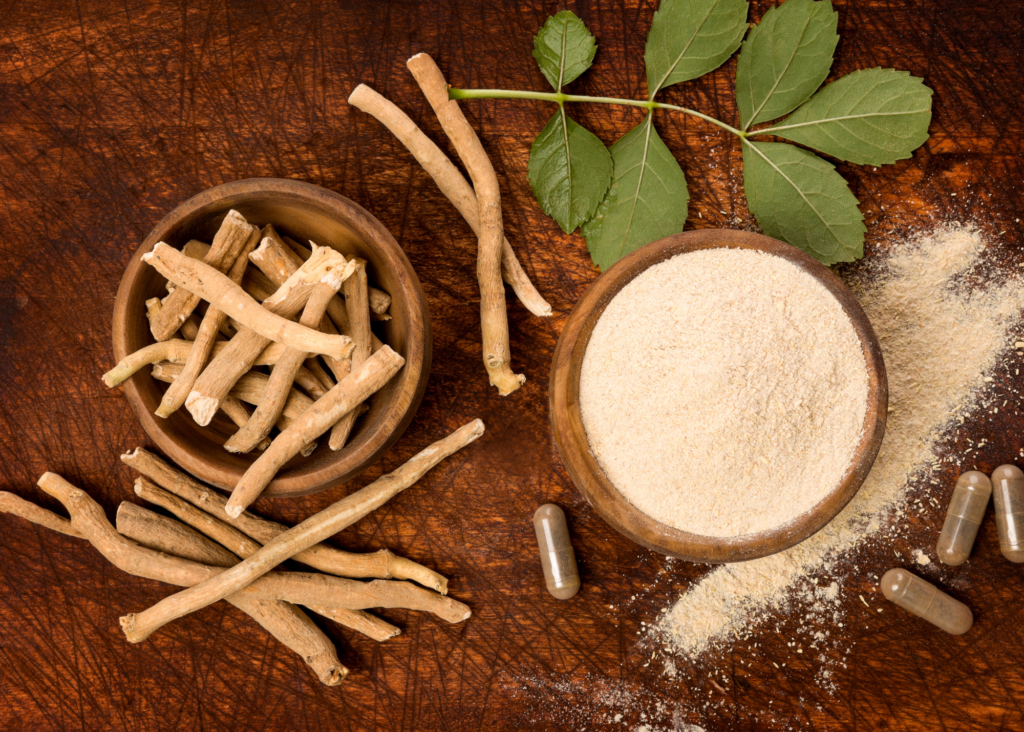No products in the cart.
The Vital Science Blog
Starting Living Your Best
- Premium Fitness Updates
- Exclusive Discounts
Body Shop: Ashwagandha

Ashwagandha
Dwayne N. Jackson, PhD
Ashwagandha, also known as Indian ginseng, is a popular medicinal plant used throughout Asia and Southern Europe. Scientifically, Ashwagandha is categorized as an adaptogen, which means it increases the body’s ability to handle stress and fatigue by maintaining hormonal balance. In Ayurvedic medicine (i.e., traditional Indian medicine), Ashwagandha is touted for its positive effects on energy, endurance, stamina, longevity, and the immune system, without causing burnout. With these benefits to energy, stamina, and immunity, it seems obvious why supplement research groups are interested in how Ashwagandha may benefit athletes.
A recent double-blind, randomized, and placebo-controlled study, published in Ayu, evaluated the efficacy of Ashwagandha root extract in enhancing cardiorespiratory endurance and improving quality of life (QOL) in 50 healthy male/female athletic adults. In this study, cardiorespiratory endurance was assessed by measuring the oxygen consumption at peak physical exertion (VO2 max) during a 20 m shuttle run test. As well, quality of life (QOL) was assessed throughout the 12-week experimental period using The World Health Organization self-reported QOL questionnaire. Subjects were randomized to either placebo group (n = 25), or Ashwagandha group (n = 25); where those in the experimental group took 300 mg of Ashwagandha (standardized to 5% withanolides) orally, twice daily for a period of 12 weeks. Subjects in placebo group received identical capsules containing sucrose.
At the end of the 12-week study, those who received Ashwagandha benefitted with an approximately 6% increase in VO2max during the 20 m shuttle run test. In fact, by week 8, the researchers reported that VO2max had already improved by nearly 5%. In contrast, those who received the placebo saw no change in VO2max throughout the study. In terms of QOL, those who took Ashwagandha had significant improvements in all areas tested including benefits to physical and psychological health, and social relationships.
ACTION POINT: As with most herbal supplements, choose extracts that have been standardized to their active component and list this on the label. In the case of Ashwagandha, products should be standardized to % withanolides. Based on the current study, we recommend taking 300 mg Ashwagandha extract, standardized to 5% withanolides (15 mg of withanolides) upon waking and before bed.
Reference:
Choudhary B, Shetty A, Langade DG. Efficacy of Ashwagandha (Withania somnifera [L.] Dunal) in improving cardiorespiratory endurance in healthy athletic adults. Ayu. 2015 Jan-Mar;36(1):63-8.
Become a PRO with PROBIOTICS
Probiotics are live bacteria that reside in the body, which are necessary for health. We are born with a natural array of these digestive bacteria and we gain/replenish stores by eating naturally fermented foods (like natural yogurt, kefir, and sauerkraut). In a healthy body, bacterial cells outnumber our human cells by about 10x; however, with increased consumption of processed foods, diets with little variety, and the use of prescription antibiotics, we tend to lose a lot of these digestive catalysts, making supplementation necessary. Probiotic supplementation is attracting attention in sports communities as an approach to promote good health and exercise performance— a recent comprehensive review of probiotic supplementation in athletes, published in the European Journal of Sport Science concluded that:
- Gastrointestinal health is essential for regulating adaptation to exercise. Symptoms such as nausea, bloating, cramping, and diarrhea occur in many athletes, particularly during prolonged exhaustive events.
- Probiotic supplementation in highly active individuals during competition and stressful training periods reduces frequency, severity and/or duration of respiratory and gastrointestinal illness.
- Mechanisms of action for probiotics include boosting the gut microbiota and interactions with the immune system and immune signalling in a variety of organs.
ACTION POINT: Probiotics come in many different forms, the most common ones include Lactobacillus and Bifidobacteria—which also have many strains. The easiest way to get into the world of probiotics is to choose a probiotic product that includes an array of different forms of bacteria. Make sure the product you choose contains enough bacteria to provide at least 9-10 billion colony-forming units (cfu) daily. Take as directed with food and always refrigerate after opening.
Reference:
Pyne DB, West NP, Cox AJ, Cripps AW. Probiotics supplementation for athletes – clinical and physiological effects. Eur J Sport Sci. 2015;15(1):63-72.
SHARE THIS POST:
Coaching Subscriptions packages
Starting Living Your Best
- Premium Fitness Updates
- Exclusive Discounts
If you’re interested in staying fit, eating healthy, and living a healthier life, then you should join my newsletter! I’ll be sending out regular updates on fitness nutrition and health, so you can stay informed and make the most of your health.
